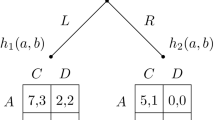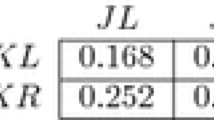Abstract
Two agents independently choose mixed m-recall strategies that take actions in finite action spaces A 1 and A 2. The strategies induce a random play, a 1, a 2, . . ., where a t assumes values in A 1 × A 2. An M-recall observer observes the play. The goal of the agents is to make the observer believe that the play is similar to a sequence of i.i.d. random actions whose distribution is \({Q\in\Delta(A_1\times A_2)}\). For nearly every t, the following event should occur with probability close to one: “the distribution of a t+M given a t , . . . , a t+M-1 is close to Q.” We provide a sufficient and necessary condition on m, M, and Q under which this goal can be achieved (for large m). This work is a step in the direction of establishing a folk theorem for repeated games with bounded recall. It tries to tackle the difficulty in computing the individually rational levels (IRL) in the bounded recall setting. Our result implies, for example, that in some games the IRL in the bounded recall game is bounded away below the IRL in the stage game, even when all the players have the same recall capacity.
Similar content being viewed by others
References
Alon N, Spencer JH (2000) The probabilistic method, 2nd edn. John Wiley & Sons, New York
Bavly G, Neyman A (2003) Online concealed correlation by boundedly rational players. Discussion paper 336. Center for the Study of Rationality, Hebrew University, Jerusalem
Ben-Porath E. (1993) Repeated games with finite automata. J Econ Theory 59(1): 17–32
Cover TM, Thomas JA (2006) Elements of information theory, 2nd ed. Wiley Interscience, New York
Gossner O (2000) Sharing a long secret in a few public words. THEMA Working papers 2000-15, Théorie Economique, Modélisation et Applications, Université de Cergy-Pontoise
Gossner O, Tomala T (2007) Secret correlation in repeated games with imperfect monitoring. Math Oper Res 32: 413–424
Lehrer E (1988) Repeated games with stationary bounded recall strategies. J Econ Theory 46(1): 130–144
Neyman A (2008) Learning effectiveness and memory size. Discussion paper 476. Center for the Study of Rationality, Hebrew University, Jerusalem
Neyman A, Okada D (2000) Repeated games with bounded entropy. Games Econ Behav 30(2): 228–247
Neyman A, Okada D (2009) Growth of strategy sets, entropy, and nonstationary bounded recall. Games Econ Behav 66(1): 404–425
Neyman A, Spencer J (2010) Complexity and effective prediction. Games Econ Behav 69(1): 165–168
Ornstein D (1970) Bernoulli shifts with the same entropy are isomorphic. Adv Math 4(3): 337–352
Peretz R (2012) The strategic value of recall. Games Econ Behav 74(1): 332–351
Shapira A (2008). Communication games with asymmetric information. PhD thesis, Hebrew University, Jerusalem
Author information
Authors and Affiliations
Corresponding author
Rights and permissions
About this article
Cite this article
Peretz, R. Correlation through bounded recall strategies. Int J Game Theory 42, 867–890 (2013). https://doi.org/10.1007/s00182-012-0334-x
Received:
Accepted:
Published:
Issue Date:
DOI: https://doi.org/10.1007/s00182-012-0334-x




